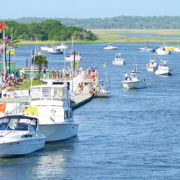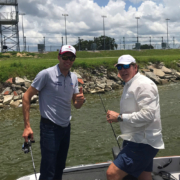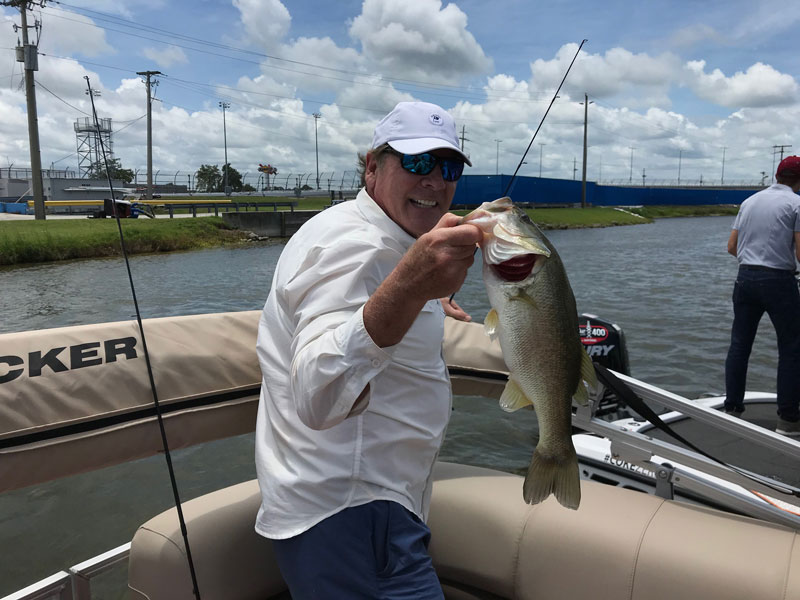Fish Tales
After the early news broadcast one night in 1981 the phone at my desk rang and it was Don Brewer. Don was well known and active in the community so when he asked me to come meet him at some trailers on Beach Blvd, I didn’t think twice.
“We’re going to have a fishing tournament,” he exclaimed as we made our way through a temporary, makeshift office.
Spread out on some tables in the room was plans for the tournament as Don explained the idea. Don, Ed Bell,, John Lowe, Pete Loftin, Bob Gipson, Bob Pittman, Charlie Hamaker, Dave Workman Sr. and Gene Leary were all well known names in town and especially in the fishing community. They came up with the idea in 1980 and put the first tournament together a year later with Don as the chairman. And the Greater Jacksonville Kingfish Tournament was born.
“This is a tournament that everybody can fish,” he continued, likening it to other tournaments. “No matter what kind of boat you have, you can get in this tournament.”
“I need to call the station,” I told him explaining that I wanted to get the story on the late news.
“Use my phone,” he said, pointing to the edge of the table.
I looked around but there wasn’t a phone in sight. I must have had this perplexed look on my face because Don laughed and said, “It’s in the briefcase.”
That’s when I laughed, opening the briefcase looking for some kind of “Slimline Princess” phone inside. Instead, it looked like something from the “Get Smart” TV show: A handle, a cord and a rotary dial.
“It’s a mobile phone, use it,” Don said as he gestured to the parts.
It was the first cell phone I had ever seen, remember this was 1981, and the first one I ever used. I did call the station and even remember saying, “Can you hear me?” when they answered.
When you hang around long enough you reach certain milestones. This is the 40th Annual Greater Jacksonville Kingfish Tournament. I’ve attended and covered and reported on every one. I’ve seen the ups and downs, the moves, the trials and triumphs of every iteration of the GJKT.
That first year the tournament was at Beach Marine. A long run from the ocean to weigh fish, but over 500 boats registered. Everything from fifteen to fifty-footers were entered. I saw one guy drop his fish in the water handing it over from the barge to the dock. He dove for it for the next ten minutes until they made him come out.
For a few years the tournament was housed at the Pablo Creek Marina. Those years were highlighted by a dedicated home for the tournament and unprecedented growth. Everybody wanted to be in the tournament or just part of the social atmosphere. It was kind of like the TPC, but different at the same time. Anyway you looked at it though, it was a big deal.
While at Pablo Creek, the tournament committee consulted the Coast Guard one year when three guys in a ski boat wanted to weight a fish they had caught in the “Chum Hole” just outside the Mayport Jetties. Their motor quit heading to the weigh-in on the Intracoastal. So they started swimming the boat to the marina.
“If the tide wasn’t coming this way,” the tournament chairman told me, “We’d have never let them do that.” Imagine, three guys, all with lines to the boat, swimming it under the Intracoastal Bridge at Atlantic Boulevard to the dock. It was quite a sight.
I’ve covered the tournament from a helicopter, seeing hundreds of boats around the “Chum Hole.” I’ve watch a wild scramble of boats coming out of the jetties, and a “Bimini” start with boats lined up along the beach. I’ve covered it from a boat and even fished in it a few years, with no success. And on Friday of the tournament in 1990, my wife called me while I was a couple of miles offshore (I had a cell phone that looked like something out of WWII) to say she was in labor. I had to get a special ruling to allow me to get off the boat and to allow the rest of the crew continue to fish and not be disqualified. I headed to the hospital and our youngest was born that night.
Over the 40 years of the GJKT, it’s had ups and downs some related to the economy, the competition, tournament leadership and location. From having to put a limit of 1,000 boats, this year’s tournament hopes to have 300 or so.
“We had no idea what to expect with the corona virus,” this year’s tournament chairman Glenn Morningstar sad this week. “We’re excited because we’re ahead of last year and if the weather looks good, we’ll have a lot of boats register before Thursday.”
Morningstar is determined to bring the tournament back to what it once was. In a way they’ve gone back to their roots with the “High Roller” tournament on Monday and the Jr. Angler kids day on Tuesday. They’re adding a past champions tournament as well.
“I’ll seek the advice of the captains and the fishermen in the area,” Morningstar said of his chairmanship. “They know what’s going on out there. They fish these tournaments and they can make it better.”
In recent years the GJKT has tried to level the competition by added a single engine class and creating north and south boundaries.
Last Wednesday I fished aboard the “Ankle Shot” with my long-time friend Billie Nimnicht in the media day tournament. We actually caught fish! Billie’s back as a sponsor of the tournament this year despite the smaller numbers expected.
“We’re just back this year,” he explained. “When my dad was running the dealership, It was the Big 5 and Big 6 Chevy dealers who were the big sponsors.”
The Nimnicht family has always been civic minded since opening their first business on Riverside Avenue in 1941. Billie’s mother Anne is a former Chairman of The Players. His uncle Ed was chairman of the GJKT. So there’s a community involvement background that ties him to the tournament, but he says it’s practical as well.
“It’s the perfect demographic for our potential customers,” he said. “They have nice boats and want to have a good-looking truck to pull it.”
As the boats got bigger, and the motors multiplied, fishermen from all over, and especially the Carolina’s showed up at the GJKT and started dominating. No longer was a ski boat in the chum hole competitive. That’s one of the things that caused the GJKT’s boat number to dwindle.
“I’m leaning on the experts on our board who are fishermen to give us things we can do to make the tournament better for fishermen,” Morningstar explained.
A one-day tournament with an affordable entry fee, a limited fishing area and a great prize turned out to be the exact formula for a successful tournament this year. The “Old School Kingfish Shootout” happened on June 13 with perfect weather, a three-mile offshore limit, and defined fishing area and a $250 entry fee.
This year’s “Old School Kingfish Shootout” was such a success, organizer Paul Dozier is hoping that rubs off on the GJKT.
“It would be good for everybody,” he said. “The better everybody does, the better it is for everybody,” he added.
With nearly 650 boats registered in their first year, the Old School Shootout’s success was a surprise to everybody.
“The fishermen spoke and showed up in droves,” Dozier explained. “I had no idea, (it would be as big as it was) it just worked out perfectly, the weather, the fishing, It was everything we needed. Maybe it was everybody wanting to get out after being stuck at home. It was families fishing together, everybody having fun. We had the small guys competing with the big guys on a level playing field.”
My memories of the Kingfish Tournament are pretty special. The people I’ve met, the friends I’ve made. Those would have never happened without this weekend in July.
Walking through the aptly named “Liar’s Tent” at the GJKT was always a treat, especially in the early years of the tournament when Anheuser-Busch was involved. It wasn’t unusual to see Joe Frazier, Mickey Mantle or a number of other sports celebrities who were sponsored by the brewery. Frazier even won the VIP tournament one year.
Taking a polygraph has become part of tournament fishing prize winning. There’s a lot at stake and organizers want to keep things on the up and up. One night the tournament winner called me to complain that he had been harassed that night in the Liar’s Tent after taking his polygraph.
“You know it’s called the “Liar’s Tent” right?” I asked. “At a fishing tournament?”
He understood and eventually laughed it off.
It was always amazing to watch Jim King identify the boats and the captains and even the fish from a stand on the dock at the new Sisters Creek Park. I knew he had a little crib sheet on the stand and an assistant but he barely ever looked at it. He was doing that well before he ran for public office and served in the state capitol. He knew everybody and their boats by name. The park was built with funds raised by the tournament. That why, rightfully, the park now bears his name.
It was a great idea forty years ago and it still has a chance to be a fun summer weekend for competitors and spectators alike.
Dozier says the Shootout will return next year without much change.
“I’m not going to change much,” he said. “We’ll expand what we’re doing for women and kids in the future to encourage those people to keep fishing together.
Morningstar says the lessons learned from the Shootout will rub off on the GJKT, but agreed, people fishing together is the key.
“The best part is the kids day, the Jr. Angler. They’re the future of the tournament.”
There are a couple of changes to the weigh-in procedure to accommodate social distancing. You might be surprised they’re holding the tournament at all in the current public health climate. Morningstar says not to worry.
“We’re having the tournament with the current Covid orders in mind,” he explained. We know the fishing community wants to fish so we’re following the orders and we’re going to fish.”






